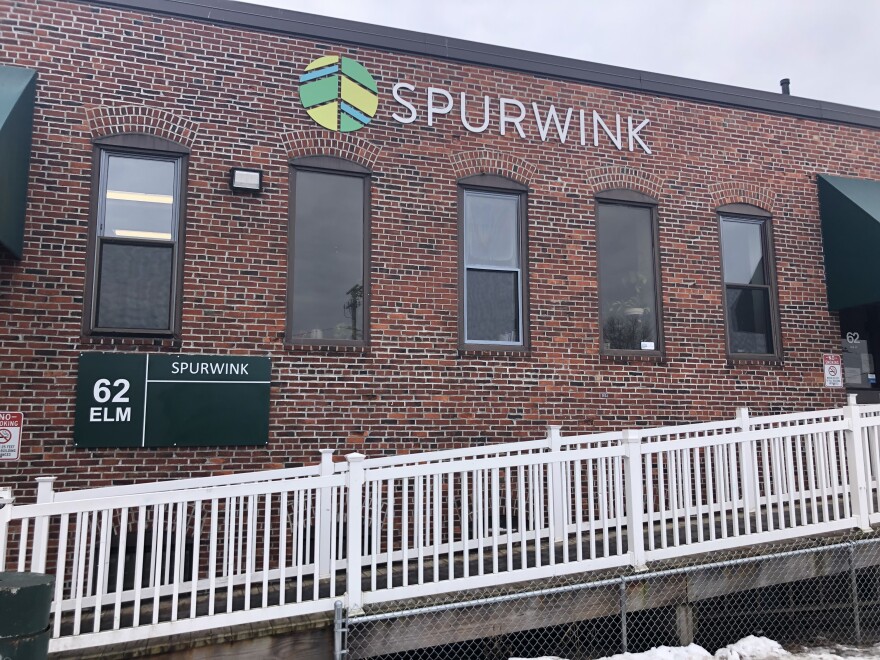It's in a brick building just a few blocks from downtown Portland. And on a recent weekday morning, it's bustling with activity.
About a dozen people are in a large central room which is designed to look less clinical and more homey. It has a skylight, barn board wall, sofa and chairs. Off of that main room are eight private meeting rooms, each with windows.
Gov. Janet Mills' proposed budget includes $1.5 million to establish a crisis receiving center in Lewiston. It's part of a broader plan that Mills announced during her State of the State address to create a statewide network of centers designed to give people in crisis immediate help. Maine's first center opened in Portland two years ago.
Anyone in crisis can come here, says Ben Strick, vice president of adult behavioral health at Spurwink. The nonprofit runs the center in partnership with Maine's Department of Health and Human Services, which provides funding for uninsured and underinsured people who seek services.
"It can be everything from a teen who's struggling at school, to a senior whose friends are dying, to somebody who's homeless and struggling with substance use," Strick says.
The center is staffed by both clinical providers and peer support specialists. People can get help with medications or talk to someone who's also experienced mental health challenges. There's a room for groups to meet, and staff can help connect people to other services in the community. It also has a kitchen stocked with snacks, showers, and laundry. It's open 24/7, but it's not a residential program. People can stay up to 23 hours at a time.

"And they know that they can come here, and they know that they can come back," says program manager Megan Duest. She says it's a "no wrong door" model, meant to provide immediate help for whoever walks in.
"And so that is the big piece, is like, we want to encourage people to come back if they need to. And they know that there's no barrier to do that," Duest says. "They don't need to call, they don't need a referral. It is absolutely like a walk in and we'll greet you and figure out what you need."
Peer support specialist Brandon Klym knows from personal experiences what it's like to need immediate care. When he first tried to get treatment for substance use disorder, he says he couldn't get into any programs. So, he continued to use until a friend helped him find treatment out of state.
"Being there myself, I can understand whenever that time has come for you to receive help, and you are going to search for it, and then you are denied it, it can be extremely heartbreaking as well as demeaning, and it deters you from ever accessing help again," he says.
And when mental health care isn't available, the response often falls to law enforcement, which can lead to incarceration. At the Portland Police Department, behavioral health coordinator Bridgit Sliwak says she frequently gets calls from community members and businesses who see someone struggling.
"And we might end up interacting with that person multiple times a day. And prior to this, I think it was really just a struggle. Like, where can this person go? How can we assist them?"
Now, Sliwak says, the police department brings people to the crisis center several times a week.
"I actually brought someone there this morning," she says.
The center is also an alternative to the emergency department. Dr. Christopher Racine, director of emergency psychiatry at Maine Medical Center, says the hospital interacts with the crisis center on a near daily basis. Patients who show up in the busy ER are often redirected to the receiving center.
"Because everybody's very busy and overwhelmed with extremely long waitlists in the community right now, there was just this incredible need for this service that's available on demand that doesn't exist outside the emergency room."
In just two years, the center has served more than 1,200 people. Simonne Maline, the executive director of the Consumer Council System of Maine, says the center's strength is that it keeps people out of emergency rooms and has a strong focus on peer support.
"Often the most powerful thing we can do with one another in a crisis is sit and listen," says Malinne.
Lewiston could be the next place in Maine to have a crisis receiving center. If lawmakers approve Gov. Mills' budget proposal, it's expected the center could be up and running within a year.



